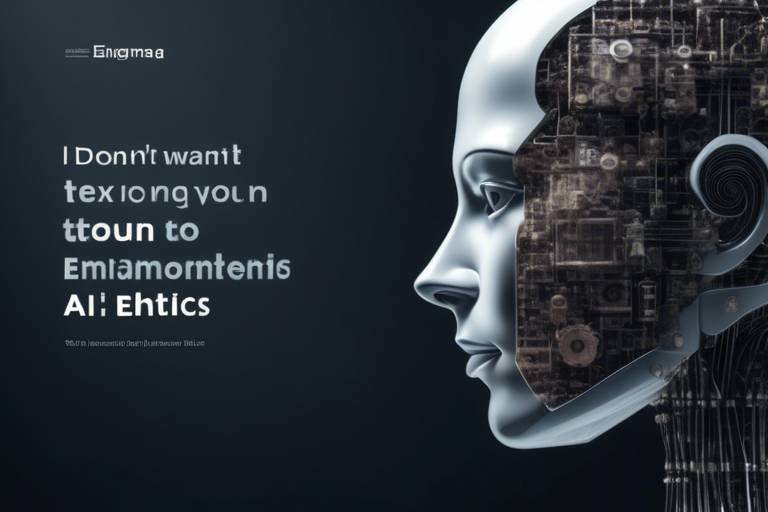Growing Future Leaders in AI Ethics
In an era where technology is evolving at lightning speed, the significance of AI ethics has never been more pronounced. As artificial intelligence becomes an integral part of our daily lives, the need for leaders who can navigate the ethical complexities surrounding this technology is critical. Imagine a world where AI systems not only function efficiently but also respect human values and rights. This vision is achievable, but it requires a concerted effort to cultivate future leaders who are not only technically proficient but also ethically aware. The journey towards responsible AI development starts with education, collaboration, and a commitment to ethical principles.
At the heart of this endeavor lies the understanding that AI is not just a tool; it’s a powerful entity that can influence decisions, shape societies, and even impact our personal lives. The implications of ethical considerations in AI are vast. From biased algorithms to privacy concerns, the potential for harm is significant if ethical frameworks are not prioritized. Therefore, nurturing leaders who can critically assess these implications is essential for the future of technology.
To achieve this, we must look at educational strategies that foster a deep understanding of AI ethics. Academic institutions play a pivotal role in this process by integrating ethics into technology curricula. By doing so, they can equip students with the necessary skills to approach AI development responsibly. This involves not only teaching the technical aspects of AI but also instilling a sense of ethical responsibility. Students should be encouraged to ask questions like: "What are the societal impacts of this technology?" and "How can we ensure fairness and transparency in AI systems?"
Moreover, the role of collaboration cannot be overstated. By bringing together experts from various fields—such as technology, philosophy, and social sciences—we can create a rich tapestry of insights that enhance our understanding of AI ethics. This interdisciplinary approach allows for a comprehensive examination of the ethical dilemmas faced in AI development, ensuring that future leaders are well-rounded and equipped to tackle complex challenges.
In addition to academic knowledge, practical experience is invaluable. Case studies of real-world ethical dilemmas in AI serve as powerful learning tools. They provide concrete examples of how ethical decisions can lead to significant consequences. For instance, consider the case of facial recognition technology, which has raised concerns about privacy and surveillance. By analyzing such case studies, aspiring leaders can gain insights into the ethical implications of their work and learn how to make informed decisions.
Another crucial aspect of developing future leaders in AI ethics is fostering critical thinking skills. These skills enable individuals to evaluate ethical issues effectively and navigate the murky waters of AI development. Educational programs should incorporate strategies that challenge students to think critically, ask probing questions, and engage in thoughtful discussions about ethical dilemmas. This way, they can learn to approach complex scenarios with a discerning eye and a sense of responsibility.
Mentorship and networking opportunities also play a significant role in shaping ethical leaders. Connecting with experienced professionals in the field can provide invaluable guidance and support. By participating in mentorship programs, aspiring leaders can gain insights into the nuances of ethical AI development and build a network of like-minded individuals committed to fostering responsible technology.
In conclusion, cultivating future leaders in AI ethics is not just a noble goal; it is a necessity for the sustainable and responsible development of technology. By prioritizing education, collaboration, and critical thinking, we can equip the next generation with the tools they need to navigate the ethical landscape of AI. As we move forward, let’s remember that the future of AI lies in our hands, and it is our responsibility to ensure that it is shaped by ethical considerations.
- Why is AI ethics important?
AI ethics is crucial because it ensures that technology is developed responsibly, with consideration for human rights, fairness, and societal impacts. - How can educational institutions contribute to AI ethics?
Educational institutions can integrate ethics into technology curricula, fostering critical thinking and ethical reasoning among students. - What role does mentorship play in developing ethical leaders?
Mentorship provides guidance and support, helping aspiring leaders navigate the complexities of ethical decision-making in AI. - What are some key competencies for leaders in AI ethics?
Essential competencies include ethical reasoning, emotional intelligence, communication skills, and stakeholder engagement.

The Importance of AI Ethics
In today's rapidly advancing technological landscape, the significance of AI ethics cannot be overstated. As artificial intelligence systems become more integrated into our daily lives, the decisions made by these technologies can have profound implications on society. Imagine a world where machines make choices that affect our jobs, healthcare, and even our personal relationships. Without a solid ethical framework guiding these decisions, we risk creating a future that is not only unfair but potentially harmful.
AI ethics is crucial for several reasons. First and foremost, it helps ensure that the development and deployment of AI technologies are aligned with human values. When we talk about ethics in AI, we are essentially discussing the moral principles that should govern how these systems operate. This includes considerations such as fairness, accountability, transparency, and privacy. Without leaders who prioritize these ethical frameworks, we could find ourselves in a situation where AI perpetuates bias, infringes on our rights, or even makes life-altering decisions without human oversight.
Moreover, the implications of ethical considerations in AI extend beyond individual users. They affect entire communities and can shape societal norms. For instance, consider the case of algorithmic bias, where AI systems trained on flawed data can lead to discriminatory practices in hiring or law enforcement. This not only harms individuals but can also erode trust in technology as a whole. Therefore, cultivating leaders who are well-versed in AI ethics is not just a nice-to-have; it is a necessity for the responsible development of technology.
To illustrate the importance of AI ethics, let's take a look at some key implications:
- Trust Building: Ethical AI fosters trust among users, which is essential for widespread adoption.
- Risk Mitigation: Understanding ethical implications can help prevent potential risks associated with AI misuse.
- Social Responsibility: Ethical considerations ensure that technology serves humanity rather than undermines it.
In conclusion, the importance of AI ethics lies in its ability to guide the responsible development of technology, ensuring that it aligns with our collective values and aspirations. As we move forward, it is imperative that we cultivate leaders who not only understand the technical aspects of AI but also appreciate the ethical dimensions that come with it. Only then can we harness the full potential of AI in a way that is beneficial for all.

Educational Pathways for Future Leaders
As we navigate the intricate landscape of artificial intelligence (AI), the need for well-rounded leaders who can address ethical challenges is more critical than ever. Cultivating these leaders starts with the right educational pathways. It’s not just about technical skills; it’s about fostering a holistic understanding of the ethical implications that AI presents. Educational institutions play a pivotal role in shaping future leaders by integrating ethical considerations into their curricula. This involves not only teaching the fundamentals of AI technology but also emphasizing the social, philosophical, and ethical dimensions that accompany its use.
Many universities are now offering specialized programs that focus on AI ethics. These programs often combine coursework in computer science with classes in philosophy, sociology, and law. For instance, a typical curriculum might include subjects like:
- Introduction to Artificial Intelligence
- Ethics in Technology
- Data Privacy and Security
- Philosophy of Mind and Machine
- Regulatory Frameworks for AI
Such interdisciplinary approaches not only equip students with the necessary technical skills but also encourage them to think critically about the moral implications of their work. Furthermore, hands-on projects and collaborative assignments allow students to engage with real-world ethical dilemmas, fostering a practical understanding of the challenges they will face as leaders in the AI field.
Moreover, institutions are increasingly recognizing the importance of experiential learning. Internships and partnerships with tech companies provide students with opportunities to apply their knowledge in real-world settings. This exposure is invaluable. It allows future leaders to see firsthand how ethical principles can be integrated into AI development and implementation. By working directly with industry professionals, students gain insights into the complexities of ethical decision-making in fast-paced environments.
One notable initiative is the establishment of ethics labs within universities, where students can collaborate on projects that address ethical issues in AI. These labs serve as incubators for innovative thinking, enabling students to brainstorm solutions to pressing ethical challenges while receiving guidance from faculty and industry experts. Such initiatives not only enhance learning but also cultivate a sense of responsibility among students, reinforcing the idea that they are future stewards of AI technology.
In summary, the educational pathways for future leaders in AI ethics must be diverse and comprehensive. By combining technical education with ethical training and real-world experience, we can ensure that the next generation of leaders is well-prepared to tackle the ethical challenges posed by AI. As we continue to develop these pathways, collaboration between educational institutions, industry, and policymakers will be essential in fostering a culture of ethical awareness and responsibility in AI development.

Interdisciplinary Approaches
In today's rapidly evolving technological landscape, the need for a robust understanding of AI ethics cannot be overstated. An interdisciplinary approach is essential in nurturing future leaders who can navigate the complex ethical landscape surrounding artificial intelligence. By merging insights from various fields such as technology, philosophy, and social sciences, we can create a holistic framework that addresses the multifaceted challenges posed by AI.
Imagine a chef creating a gourmet dish. They don't just rely on one ingredient; instead, they blend flavors from different cuisines to create something truly unique. Similarly, an interdisciplinary approach in AI ethics combines diverse perspectives, enriching our understanding of ethical implications. For instance, technology offers the technical know-how, while philosophy provides a foundation for moral reasoning, and social sciences help us understand the societal impacts of AI technologies.
To illustrate this point, consider the following table that outlines how different disciplines contribute to AI ethics:
| Discipline | Contribution to AI Ethics |
|---|---|
| Technology | Understanding algorithms, data privacy, and security measures. |
| Philosophy | Frameworks for moral reasoning, ethical theories, and decision-making processes. |
| Social Sciences | Insights into societal impacts, human behavior, and cultural considerations. |
By integrating these disciplines, we can foster a deeper understanding of ethical dilemmas in AI. For example, when developing an AI system for healthcare, it's not just about the technology itself; it’s also about understanding the ethical implications of patient data usage, the potential biases in algorithms, and the societal impact on healthcare accessibility. This multifaceted approach encourages critical thinking and ethical reasoning, essential skills for future leaders in AI ethics.
Moreover, interdisciplinary collaboration can lead to innovative solutions. When experts from different fields come together, they can challenge each other's assumptions and broaden the scope of possible solutions. This collaboration is akin to a vibrant tapestry, where each thread contributes to a richer, more complex picture of AI ethics.
In conclusion, fostering an interdisciplinary approach in education and professional development is essential for cultivating leaders who can responsibly guide AI technology. By embracing the insights from various disciplines, we can better prepare future leaders to address the ethical challenges that lie ahead, ensuring that AI serves humanity in a fair and just manner.
- What is the importance of interdisciplinary approaches in AI ethics?
Interdisciplinary approaches bring together various perspectives, enriching our understanding of ethical implications and fostering innovative solutions in AI. - How can one develop interdisciplinary skills?
Engaging in courses that combine technology, philosophy, and social sciences, and participating in collaborative projects can help develop these skills. - What role does emotional intelligence play in AI ethics?
Emotional intelligence enhances leaders' ability to empathize with diverse stakeholders, which is crucial for ethical decision-making.

Case Studies in AI Ethics
When we think about the ethical implications of artificial intelligence, real-world case studies become our guiding stars, shining light on the murky waters of decision-making. These examples not only illustrate the challenges faced by developers and organizations but also highlight the profound impact ethical considerations can have on society. One of the most compelling cases is the deployment of facial recognition technology by law enforcement agencies. While this technology promises enhanced security, it raises significant concerns regarding privacy and potential bias. For instance, studies have shown that facial recognition systems can misidentify individuals from minority groups at alarmingly higher rates than their counterparts. This discrepancy underscores the need for ethical frameworks that prioritize fairness and accountability.
Another notable case is the use of AI algorithms in hiring processes. Companies have increasingly turned to AI to streamline recruitment, but this has led to unintended consequences. In one instance, an AI system trained on historical hiring data perpetuated existing biases, favoring candidates from specific demographics while unjustly filtering out qualified individuals from others. This case serves as a stark reminder that without ethical oversight, AI can inadvertently reinforce societal inequalities. It emphasizes the critical need for leaders in AI ethics who can advocate for inclusive practices and ensure that technology serves all members of society equitably.
Moreover, the case of autonomous vehicles presents a fascinating ethical dilemma. As these vehicles become more common, they must be programmed to make decisions in potentially life-threatening situations. For example, if faced with a scenario where an accident is unavoidable, should the vehicle prioritize the safety of its passengers over pedestrians? Such questions challenge our moral frameworks and require thoughtful deliberation by those at the helm of AI development. Ethical leaders must engage in these discussions, understanding that the choices made today will shape the societal norms of tomorrow.
In summary, case studies in AI ethics are not just academic exercises; they are real-life scenarios that demand our attention. They reveal the complexities of integrating technology into our daily lives and highlight the necessity for future leaders to be equipped with the skills and knowledge to navigate these challenges. By analyzing these cases, we can better understand the ethical landscape and prepare ourselves to make informed, responsible decisions in the realm of AI.
- What are AI ethics? AI ethics refers to the moral principles and guidelines that govern the development and deployment of artificial intelligence technologies, ensuring they are used responsibly and justly.
- Why are case studies important in AI ethics? Case studies provide practical insights into the ethical dilemmas faced in AI, allowing us to learn from real-world examples and understand the implications of our choices.
- How can future leaders prepare for challenges in AI ethics? Future leaders can prepare by engaging in interdisciplinary education, developing critical thinking skills, and participating in mentorship programs focused on ethical leadership.
- What role does emotional intelligence play in AI ethics? Emotional intelligence is crucial for ethical decision-making as it allows leaders to empathize with diverse stakeholders and understand the broader impact of their decisions.

Developing Critical Thinking Skills
In a world increasingly dominated by artificial intelligence, the ability to think critically is not just a luxury—it's a necessity. As future leaders in AI ethics, individuals must cultivate a robust set of critical thinking skills that allow them to dissect complex problems, evaluate multiple perspectives, and make informed decisions. But how do we go about developing these essential skills? It’s not as straightforward as it may seem. Like a sculptor chipping away at a block of marble, aspiring leaders must engage in a process of refinement and discovery.
One of the primary avenues for developing critical thinking is through active engagement in discussions and debates. This involves not just passively absorbing information but actively questioning assumptions and exploring the implications of various viewpoints. For instance, when examining AI technologies, students should ask questions like, “What are the potential biases in this algorithm?” or “How might this technology affect marginalized communities?” By fostering a culture of questioning, we encourage a deeper understanding of ethical considerations in AI.
Moreover, real-world case studies serve as invaluable tools for honing critical thinking skills. By analyzing specific instances where ethical dilemmas arose in AI development, students can better grasp the consequences of decisions made—or not made. For example, consider the case of facial recognition technology. It raises numerous ethical questions, such as privacy concerns and the potential for racial bias. By dissecting these scenarios, students can learn to navigate the murky waters of ethical decision-making.
Additionally, educational programs should incorporate problem-based learning (PBL) methodologies. PBL encourages students to tackle real-world problems collaboratively, allowing them to practice critical thinking in a supportive environment. This approach not only develops analytical skills but also enhances teamwork and communication, which are essential for effective leadership. Imagine a group of students tasked with designing an AI system that prioritizes user privacy. They must navigate technical challenges, ethical considerations, and stakeholder interests—an exercise that perfectly encapsulates the complexities of AI ethics.
Finally, mentorship plays a crucial role in developing critical thinking skills. Experienced mentors can provide guidance, challenge assumptions, and encourage mentees to think outside the box. They can share their own experiences, illustrating how critical thinking influenced their decision-making processes. Establishing strong mentorship programs can create a ripple effect, inspiring a new generation of leaders to prioritize ethical considerations in AI development.
In conclusion, developing critical thinking skills is a multifaceted endeavor that requires active engagement, real-world application, collaborative learning, and mentorship. As future leaders in AI ethics, it is imperative to embrace this journey with curiosity and determination. The stakes are high, and the responsibility to shape a more ethical future in AI rests on their shoulders.
- What are critical thinking skills? Critical thinking skills involve the ability to analyze information, evaluate different perspectives, and make reasoned decisions.
- Why are critical thinking skills important in AI ethics? These skills are essential for navigating complex ethical dilemmas and making informed decisions that prioritize the well-being of society.
- How can I improve my critical thinking skills? Engaging in discussions, analyzing case studies, participating in problem-based learning, and seeking mentorship can all enhance critical thinking capabilities.
- What role does mentorship play in developing critical thinking? Mentors can challenge your thinking, provide guidance, and share valuable experiences that can sharpen your analytical skills.

Mentorship and Networking Opportunities
In the rapidly evolving field of AI ethics, mentorship and networking opportunities are absolutely vital for nurturing the next generation of ethical leaders. Imagine stepping into a vast, intricate web of knowledge where seasoned experts guide you through the maze of ethical dilemmas and technological advancements. This is what mentorship offers—a chance to learn from those who have walked the path before you, gaining insights that textbooks simply can't provide.
Mentorship is more than just a one-way street; it's a dynamic relationship where both mentor and mentee can grow. A mentor can share their experiences, helping you understand the nuances of ethical decision-making in AI. They can illuminate the paths that lead to success and those that lead to pitfalls. For instance, a mentor might share a cautionary tale about a project that went awry due to a lack of ethical consideration, prompting you to think critically about your own work.
Moreover, networking opens doors to collaboration and innovation. By connecting with peers and industry leaders, aspiring ethical leaders can share ideas, discuss challenges, and brainstorm solutions. Engaging in conferences, workshops, and online forums can significantly expand your horizons. The more you connect, the more you realize that you're part of a larger community dedicated to shaping the future of AI responsibly.
To illustrate the importance of these connections, consider the following table that highlights various mentorship and networking platforms available for those interested in AI ethics:
| Platform | Description | Focus Area |
|---|---|---|
| AI Ethics Lab | A collaborative space for researchers and practitioners to discuss ethical AI. | Research and Development |
| Ethics in AI Meetup | Monthly meetups to discuss current issues and share best practices. | Community Engagement |
| Women in AI | A network aimed at supporting women in the AI field through mentorship. | Diversity and Inclusion |
| AI Policy Forum | A platform for discussing AI regulations and ethical implications. | Policy Advocacy |
In addition to formal platforms, informal networking can be just as beneficial. Engaging with peers during university projects or participating in hackathons can lead to lasting relationships. These interactions often spark new ideas and collaborations that might not occur in a traditional classroom setting. It’s like planting seeds; you never know which connections will blossom into groundbreaking initiatives.
Ultimately, the journey to becoming a leader in AI ethics is not one you should take alone. Surrounding yourself with mentors and a robust network can provide you with the support, guidance, and inspiration needed to navigate the complex landscape of AI. So, seek out those mentorship opportunities, attend networking events, and immerse yourself in discussions about ethical AI. The future of technology—and ethics—depends on leaders who are well-connected, informed, and ready to make a difference.
- What is the role of mentorship in AI ethics?
Mentorship provides guidance and insights from experienced professionals, helping aspiring leaders navigate ethical challenges in AI. - How can I find a mentor in AI ethics?
Look for mentorship programs, attend industry conferences, and engage in online forums dedicated to AI ethics. - Why is networking important for future leaders in AI ethics?
Networking fosters collaboration, idea sharing, and access to opportunities that can enhance your understanding and influence in the field.

Key Competencies for Ethical Leadership
In the rapidly evolving landscape of artificial intelligence, the need for ethical leadership has never been more pressing. Future leaders in AI ethics must possess a unique blend of competencies that enable them to navigate the complex ethical dilemmas that arise from technological advancements. These competencies not only empower leaders to make informed decisions but also help them advocate for responsible AI practices. So, what are these essential skills that every aspiring ethical leader should cultivate?
First and foremost, ethical reasoning stands as a cornerstone of effective leadership in this field. Leaders must be able to critically evaluate situations, weighing the potential benefits against ethical implications. This involves understanding various ethical frameworks, such as utilitarianism, deontology, and virtue ethics, and applying these theories to real-world scenarios. For instance, when developing an AI system for hiring, leaders must consider not only efficiency but also fairness and bias. This requires a deep understanding of how algorithms can perpetuate existing inequalities.
Next, communication skills are vital. Ethical leaders need to articulate their values and the reasoning behind their decisions clearly. This means being able to engage with diverse stakeholders, including technologists, ethicists, and the general public. In a world where misinformation can spread like wildfire, the ability to communicate effectively can make or break trust in AI initiatives. Leaders should be adept at crafting messages that resonate with different audiences and foster open dialogues about ethical considerations.
Furthermore, stakeholder engagement is crucial. Ethical leaders must actively involve various stakeholders in the decision-making process. This includes not only technical teams but also community members who may be impacted by AI technologies. By fostering an inclusive environment, leaders can gather a broader range of perspectives, leading to more comprehensive and ethical solutions. For example, when designing an AI tool for healthcare, input from patients, doctors, and ethicists can illuminate potential ethical pitfalls that may not have been initially considered.
In addition to these competencies, emotional intelligence plays a significant role in ethical leadership. Leaders with high emotional intelligence can better empathize with others, understanding their concerns and motivations. This empathy is essential when addressing the fears and anxieties that often accompany new technologies. By connecting with stakeholders on a human level, ethical leaders can foster trust and collaboration, which are critical for the successful implementation of AI initiatives.
Lastly, the ability to engage in advocacy and policy influence is an indispensable competency for future leaders. As AI technologies continue to advance, the regulatory landscape will inevitably evolve. Ethical leaders must not only stay informed about these changes but also actively participate in shaping them. This involves advocating for policies that promote ethical standards in AI development and engaging with lawmakers and regulatory bodies to ensure that ethical considerations are at the forefront of technological advancement.
In summary, the journey to becoming an ethical leader in AI is multifaceted, requiring a combination of ethical reasoning, communication skills, stakeholder engagement, emotional intelligence, and advocacy. By developing these competencies, future leaders can navigate the complex ethical landscape of AI, ensuring that technology serves humanity responsibly and equitably.
- What is the role of ethical reasoning in AI leadership?
Ethical reasoning allows leaders to evaluate the implications of their decisions, ensuring that they align with moral principles and societal values. - How important is emotional intelligence in ethical leadership?
Emotional intelligence is crucial for understanding and empathizing with stakeholders, which helps build trust and collaboration. - Why should leaders engage with stakeholders?
Engaging with stakeholders provides diverse perspectives that can lead to more ethical and comprehensive solutions in AI development. - What advocacy roles should ethical leaders take?
Ethical leaders should advocate for policies that promote responsible AI practices and engage with regulatory bodies to influence ethical standards.

Emotional Intelligence in Leadership
When we talk about leadership, especially in the realm of AI ethics, one term that often pops up is emotional intelligence (EI). But what does that really mean? Imagine you're steering a ship through turbulent waters; your ability to read the waves, adjust your sails, and keep your crew motivated is akin to having high emotional intelligence. In the context of AI ethics, leaders must navigate complex emotional landscapes, understanding not just the technology but also the human implications it carries.
Emotional intelligence encompasses several key components: self-awareness, self-regulation, motivation, empathy, and social skills. Each of these elements plays a critical role in how leaders make decisions regarding AI technologies. For instance, a leader with high self-awareness can recognize their biases and how these might affect their judgment in ethical dilemmas. Similarly, empathy allows them to see issues from multiple perspectives, ensuring that the voices of all stakeholders, especially marginalized communities, are heard and considered.
Moreover, the ability to self-regulate is crucial. In the fast-paced world of AI, where decisions can have immediate and far-reaching consequences, leaders must remain calm and composed, even under pressure. This quality not only helps in making well-informed decisions but also instills confidence in their teams. When leaders demonstrate emotional intelligence, they create an environment where open dialogue is encouraged, fostering a culture of collaboration and trust.
To illustrate the significance of emotional intelligence in leadership, let’s consider a few scenarios:
- Scenario 1: A tech company faces backlash over biased algorithms. A leader with high EI would engage with affected communities, listen to their concerns, and work towards rectifying the issues.
- Scenario 2: During a crisis, such as data breaches, emotionally intelligent leaders can maintain team morale by communicating transparently and reassuring their teams, thus enabling a swift and effective response.
In essence, emotional intelligence is not just a nice-to-have; it’s a necessity for leaders in AI ethics. It empowers them to advocate for responsible practices, engage in meaningful conversations with stakeholders, and ultimately, make decisions that align with ethical standards. As AI continues to evolve, the need for leaders who can blend technical knowledge with emotional acuity becomes increasingly vital.
- What is emotional intelligence? Emotional intelligence refers to the ability to recognize, understand, and manage our own emotions as well as the emotions of others.
- Why is emotional intelligence important in AI ethics? It helps leaders navigate complex emotional landscapes, ensuring that ethical considerations take into account the human impact of AI technologies.
- How can one develop emotional intelligence? Through self-reflection, empathy exercises, and seeking feedback from peers, individuals can enhance their emotional intelligence.

Advocacy and Policy Influence
In the rapidly evolving landscape of artificial intelligence, the need for strong advocacy and policy influence cannot be overstated. As we witness the integration of AI into various sectors, from healthcare to finance, the implications of ethical considerations become increasingly complex. Future leaders must not only understand the technology but also actively engage in shaping the policies that govern its use. This is where advocacy comes into play, serving as the bridge between ethical principles and practical implementation.
Advocacy in AI ethics involves promoting best practices and ethical standards that ensure technology serves humanity positively. It requires leaders to be vocal about the potential risks associated with AI, such as bias, privacy violations, and job displacement. For instance, consider the role of a community leader who champions the adoption of transparent algorithms in local government systems. By advocating for ethical guidelines, they can influence policies that protect citizens while still harnessing the benefits of AI.
Moreover, engaging with regulatory frameworks is essential for fostering responsible AI development. Leaders in AI ethics must collaborate with policymakers to create robust regulations that address ethical concerns while promoting innovation. This collaboration can take many forms, including:
- Participating in public consultations on AI regulations.
- Joining interdisciplinary committees that focus on technology and ethics.
- Collaborating with NGOs and advocacy groups to raise awareness of ethical AI issues.
To effectively advocate for ethical practices, future leaders must develop a deep understanding of the legal and regulatory landscape surrounding AI. This includes staying informed about existing laws, proposed legislation, and international standards. By doing so, they can identify gaps in current policies and advocate for necessary changes. For example, leaders might push for regulations that require AI systems to undergo bias testing before deployment, ensuring that they operate fairly and equitably.
Furthermore, advocacy is not just about influencing policy; it’s also about educating stakeholders. Future leaders should seek to raise awareness among various groups, including businesses, government agencies, and the general public. By facilitating workshops, seminars, and discussions, they can help demystify AI and its ethical implications. This education can empower stakeholders to make informed decisions regarding AI use and development.
Ultimately, the role of advocacy and policy influence in AI ethics is about creating a framework where technology can thrive without compromising ethical standards. As future leaders step into this arena, they must be prepared to tackle the challenges head-on. Their efforts can lay the groundwork for a future where AI is developed and used responsibly, benefiting society as a whole.
- What is the role of advocacy in AI ethics? Advocacy plays a crucial role in promoting ethical standards and influencing policies that govern AI technology.
- How can future leaders influence AI policy? Future leaders can influence AI policy by engaging with policymakers, participating in public discussions, and advocating for ethical guidelines.
- Why is emotional intelligence important in AI leadership? Emotional intelligence helps leaders empathize with diverse stakeholders, facilitating better communication and ethical decision-making.
Frequently Asked Questions
- What is AI ethics and why is it important?
AI ethics refers to the moral principles and guidelines that govern the development and deployment of artificial intelligence technologies. It's crucial because as AI systems become more integrated into our lives, they can significantly impact society. Ethical considerations help ensure that these technologies are developed responsibly, prioritizing human rights, fairness, and accountability.
- How can educational programs help foster future leaders in AI ethics?
Educational programs play a vital role by equipping students with the necessary knowledge and skills to navigate the ethical landscape of AI. By incorporating interdisciplinary approaches, such as blending technology with philosophy and social sciences, these programs can cultivate a well-rounded understanding of the ethical implications associated with AI development.
- What key competencies should future leaders in AI ethics possess?
Future leaders in AI ethics should have competencies like ethical reasoning, strong communication skills, and the ability to engage stakeholders effectively. Additionally, emotional intelligence is essential, as it enables leaders to empathize with diverse perspectives and make informed, ethical decisions.
- How do mentorship and networking contribute to developing ethical leaders?
Mentorship and networking are crucial for aspiring leaders in AI ethics. They provide opportunities to learn from experienced professionals, share knowledge, and build valuable connections. These relationships can help guide future leaders in navigating ethical challenges and influence their career paths positively.
- What role does emotional intelligence play in ethical decision-making?
Emotional intelligence is vital in ethical decision-making as it helps leaders understand and connect with the emotions of others. This ability to empathize allows leaders to consider the broader impact of their decisions on various stakeholders, fostering a more inclusive and ethical approach to AI development.
- Why is advocacy important for future leaders in AI ethics?
Advocacy is essential for future leaders because it empowers them to influence policy and promote ethical standards in AI development. Engaging with regulatory frameworks and actively participating in discussions about ethical practices can help shape a responsible AI landscape that prioritizes societal well-being.



















